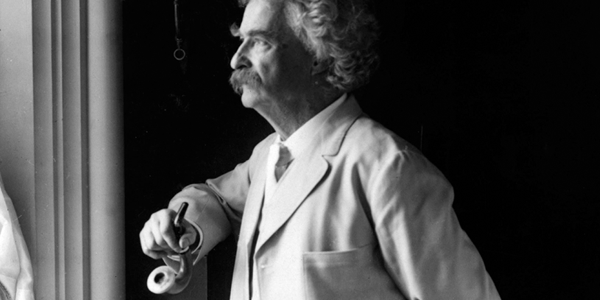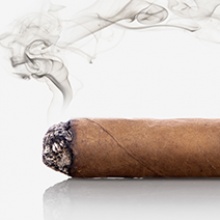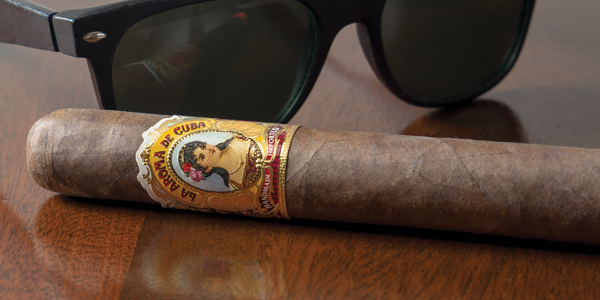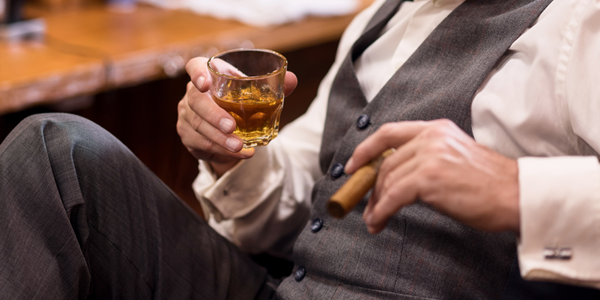Mark Twain
The New York Times, in its obituary of Samuel Langhorne Clemens – known to most as Mark Twain – called him the “greatest humorist the United States has produced.” And it’s true, Twain (we’ll use his more common name) was a funny man, a great and moralistic writer, and a true curmudgeon. But for our purposes, Mark Twain, who said he began smoking at the age of eight, was an unabashed, unapologetic, and unrepentant cigar smoker.
Becoming Mark Twain
Twain the writer gave us the classics, Tom Sawyer and Huckleberry Finn. The author plucked the moniker “Mark Twain” from his Mississippi riverboat days, copying the reference for measuring the depth of the water when it becomes a safe level. Twain, however, was rarely one for caution. Neither in his work, nor in his avocation for smoking. According to the Mark Twain House in Hartford, Connecticut, he smoked 22 cigars every day.
How Many Cigars a Day?!?!?!
Actually, some estimates of Twain’s daily consumption of cigars put the number closer to 40.
"I smoke with all my might, and allow no intervals," he once said. So, how many cigars could Twain have smoked in a day? His close friend and fellow novelist, William Dean Howells offers some insight.
"Clemens was a great walker," Howells wrote in the biography, My Mark Twain. "As he walked of course he talked, and of course he smoked. Whenever he had been a few days with us, the whole house had to be aired, for he smoked all over it from breakfast to bedtime. He always went to bed with a cigar in his mouth, and sometimes, mindful of my fire insurance, I went up and took it away, still burning, after he had fallen asleep. I do not know how much a man may smoke and live, but apparently he smoked as much as a man could, for he smoked incessantly."
Twain himself was quick, and witty, in defending his smoking habit. "I smoke in moderation," he said. "Only one cigar at a time."
For the Sake of the Marriage
Twain’s wife, Olivia, was not happy with the cigar smoking. Twain understood this and tried to quit numerous times. It just didn’t stick. "To cease smoking is the easiest thing," Twain once said. "I ought to know. I've done it a thousand times."
In Following the Equator, a travelogue that recounts the author’s adventures in sailing from British Columbia, Canada, to the South Pacific and then South Africa, Twain wrote, "I pledged myself to smoke but one cigar a day. I kept the cigar waiting until bedtime, then I had a luxurious time with it. But desire persecuted me every day and all day long. I found myself hunting for larger cigars...within the month my cigar had grown to such proportions that I could have used it as a crutch."
The Cigar as a Muse
In the definitive biography of Twain, Mr. Clemens & Mr. Twain, Justin Kaplan recounted that Twain thought giving up cigars was "ludicrous and hateful."
"I am sure," Twain said regarding Olivia's urging him to give up smoking, "it has caused us more real suffering than would accrue from smoking a million cigars."
When Twain married in 1870, he did try to quit smoking. During his abstinence from cigars, he received a commission to write Roughing It, a semi-biographical novel (his second) about traveling from St. Louis to Hawaii.
“He came almost to a full stop as a writer that year," Kaplan reported, for when Twain wrote, that’s when he smoked the most.
"I was three weeks writing six chapters," Twain recalled. "Then I gave up the fight, resumed my three hundred cigars [a month], burned the six chapters, and wrote the book in three months, without any bother or difficulty. I ordinarily smoke fifteen cigars during my five hours' labours, and if my interest reaches the enthusiastic point, I smoke more. I smoke with all my might.”
What Cigars Did Twain Smoke?
Mark Twain’s cigar habits offended and shocked many who met him, not only because of the number of cigars he smoked. He had “odd” tastes in cigars. Some reported that Twain would buy Cuban cigars when he could afford them, though he once wrote, “Nearly any cigar will do me, except a Havana."
The legend, as it’s told, is that Twain would sample the better cigars of the day but was unhappy with them. He found a tobacconist in New York and Twain insisted that he be provided the worst cigars. He was delighted. He certainly did not, like others he knew, “smoke the label.”
"No one can tell me what is a good cigar—for me," Twain wrote in Concerning Tobacco, an essay published from the 1890s. "I am the only judge. People who claim to know say that I smoke the worst cigars in the world. They bring their own cigars when they come to my house. They betray an unmanly terror when I offer them a cigar; they tell lies and hurry away to meet engagements which they have not made when they are threatened with the hospitalities of my box. Now then, observe what superstition, assisted by a man's reputation, can do. I was to have twelve personal friends to supper one night. One of them was as notorious for costly and elegant cigars as I was for cheap and devilish ones. I called at his house and when no one was looking borrowed a double handful of his very choicest; cigars which cost him forty cents apiece and bore red-and-gold labels in sign of their nobility. I removed the labels and put the cigars into a box with my favorite brand on it—a brand which those people all knew, and which cowed them as men are cowed by an epidemic. They took these cigars when offered at the end of the supper, and lit them and sternly struggled with them—in dreary silence, for hilarity died when the fell brand came into view and started around—but their fortitude held for a short time only; then they made excuses and filed out, treading on one another's heels with indecent eagerness; and in the morning when I went out to observe results the cigars lay all between the front door and the gate. All except one—that one lay in the plate of the man from whom I had cabbaged the lot. One or two whiffs was all he could stand. He told me afterward that some day I would get shot for giving people that kind of cigars to smoke."
Twain’s cigars were quite offensive to others. A reporter for the New York World, mystified by the "long, black, deadly-looking cigars" that Twain smoked during an interview in 1902, wrote, "Their mere appearance compels comment. You express surprise that the first one was not guilty of murder."
Cutting Back
Twain, two years before passing away in 1910, had an angina attack, Kaplan, the biographer, wrote. "[Twain] said it was 'tobacco heart' and he tried to cut down his cigars from forty to four a day."
Twain, who had reportedly been in excellent health until then, lived to 74. He always found a great companion and great comfort cigars. He called cigars “the best of all inspirations.”






